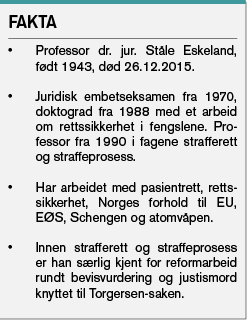(THIS ARTICLE IS MACHINE TRANSLATED by Google from Norwegian)
Staal Eskeland was a criminal justice professor with a keen interest in international crimes. He worked with peace law, the right and the duty of peace, and spoke for himself The most serious crimes (Cappelen Damm, 2011) as his main work. In this book, Eskeland deals with the major international crimes â € “war crimes, crimes against peace, genocide, torture â €” and it contains legal review of the state of law in both Norwegian and international law. He did not need to go to great lengths to find practical illustrations, but did show that sitting Norwegian political and military leaders were responsible for war crimes.
 Lately half the year he had the pleasure of seeing a public discussion about the Libya war. Now that we remember his life and work, there may be reason to bring out some of what Eskeland wrote about the Libya war already in 2011:
Lately half the year he had the pleasure of seeing a public discussion about the Libya war. Now that we remember his life and work, there may be reason to bring out some of what Eskeland wrote about the Libya war already in 2011:
"Shortly before the book goes to press, Norway became involved in a new war, this time in Libya. Based on Security Council Resolution 1973 (2011), Norway sent six F-19 fighter jets to the region on 16 March. The purpose is to protect civilians who revolt against Libya's dictator Muammar Gaddafi. This was in line with international law, since there is a UN mandate. But questions may be raised about the bombing of cities within the mandate. In addition, the decision to send aircraft was made without formal decision in the government, but in telephone conversations between members of the government and central parliamentary politicians. This is contrary to Grl. Section 28, which requires that 'Cases of Importance' be decided by the King in the Cabinet of Ministers, that is, by the Government in a meeting under the King's leadership.
Eskeland's book was met with the powerless silence that has become the constant response to unpleasant criticism.
Norway's participation in the war in Libya follows a pattern: It has become routine for Norway to go to war without seriously taking the legal boundaries provided by the Constitution and international law. [International Law Attorney] Simma Bruno's warning that the narrow limits of international law to use military force are threatened more than ever before in UN history, you see few traces of today's Norwegian foreign and security policy. "
Eskeland uses Former Foreign Minister Jan Petersen (H) as an example of the mismatch between beautiful program statements and practical policy:
«Norwegian political leaders often emphasize that Norwegian foreign and security policy is based on the UN Charter and current international law. For example, then-Foreign Minister Jan Petersen said in the Storting on December 15, 2003, after Norway participated in the attacks on Yugoslavia, Afghanistan and Iraq – all without a UN mandate:
“In the fight against these new security threats, the Government is emphasizing the role the UN can – and should – play. It is the UN Security Council that has the primary responsibility for maintaining international peace and security. We must support the role and responsibility of the UN as a peacekeeping body, and we must contribute to the UN getting the resources it needs to fulfill its functions.
As regards the framework for Norwegian participation in such operations [I.e. "Peace operations", Eskeland's addition], there is a clear requirement: a Norwegian commitment must comply with international law. This means that any use of force must be enshrined in international law, either in the consent of the parties, in the right to individual or collective self-defense or by a mandate from the UN Security Council under Chapter VII or VIII of the Pact. Without such an anchorage, there is no basis for contributions involving the exercise of coercive power. ”
It is easy to agree with such a basic attitude. But it is not followed in practice. When Norway's foremost NATO ally, with the support of a number of other countries, does not respect the ban on the use of military force to resolve international conflicts, it also leads Norwegian leaders to be co-responsible for the aggression crimes of Western powers. ”
This is the conclusion of a short chapter on "Norway and the new wars" (pp. 140–2) where Eskeland's point of departure is that it must be specifically assessed whether a military attack is in violation of international law and / or § 26 of the Constitution, and possibly also punishable. Apart from the Nuremberg Court and Tokyo Court rulings, where a number of German and Japanese leaders were convicted of crimes of peace, there has not been a single criminal case for international courts or Norwegian courts relating to the aggression crime. However, there is no doubt that a number of military attacks after World War II have been in violation of the prohibition on the use of military force in Article 2 (4) of the UN Charter, in that they have not been mandated by the UN Security Council under the UN Article 42 of the Pact, nor has it been lawful exercise of self-defense law, cf. Article 51 of the UN Charter.
Eskeland in particular highlights a leading jurist in the field, Bruno Simma, who has been a judge of the International Court of Justice since 2003, and his foreword to a 2005 book on international customary law and the use of force. Here Simma points out that the aftermath of September 11 has been an undermining of the prohibition on the use of military force which is the very cornerstone of the UN Charter. The ban has never been more fundamentally challenged during the 60 years it has existed. States are no longer bothered to invoke legal self-defense – what we see today is, according to Simma, "an increasingly open challenge to the very justification and desirability of the UN system to prevent violence". He continues: "Instead, one sees an increasingly unrestrained use of military power by 'the few privileged'. This development started with NATO's air strikes in the Kosovo crisis, continued with the war in Afghanistan, and culminated with the invasion of Iraq. While with a large portion of benevolence one might think that the first two were in something that could be considered as legally close to international law, the Iraq war appears to be a disappointing case, probably unparalleled, of an open breach of the prohibition on military force. The series of alternate attempts to defend behavior, both before and after, only added ridicule. "
One more solid substantiated and massive criticism of Norwegian foreign policy, as illegal under both Norwegian and international law, has hardly been seen. Our top political and military leaders should have been in the box. Instead, the rapid efforts of Norwegian forces in Libya became a stepping stone to the top position in the Western military alliance. And Eskeland's book was met with the powerless silence that has become the constant response to unpleasant criticism in what democracy our military alliance is said to defend.


